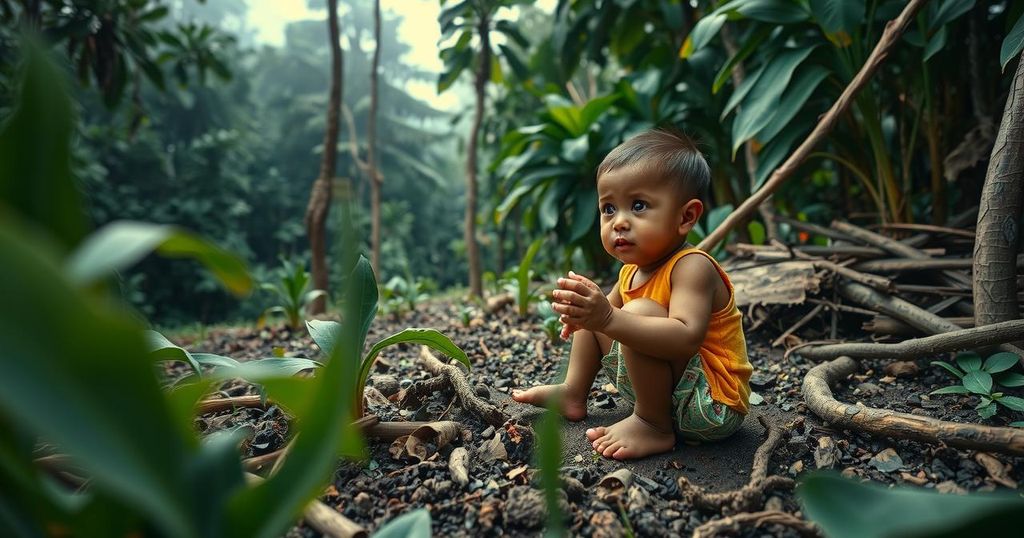The United Nations reports that more than 420,000 children in the Amazon basin are severely affected by drought, leading to water scarcity and significant disruptions in education and healthcare services. UNICEF calls for increased climate financing to mitigate child malnutrition and water-related health issues. Recent drought conditions are exacerbated by the 2023-2024 El Niño phenomenon, impacting various South American countries. Brazil’s environment minister noted a 30 percent decrease in deforestation, showing positive environmental progress amid the crisis.
The United Nations (UN) has reported that over 420,000 children in the Amazon basin are facing alarming levels of water scarcity and drought, severely impacting communities in Brazil, Colombia, and Peru. This unprecedented drought, persisting since last year, has raised concerns due to its repercussions on essential services such as education and health care for Indigenous and local populations reliant on river connectivity. Ahead of the COP29 climate summit in Baku, Azerbaijan, UNICEF is urging governmental leaders to amplify climate financing initiatives dedicated to children and vulnerable communities amid worsening conditions. The negative consequences of the drought have exacerbated food insecurity, elevating the risk of malnutrition among children, while the limited access to potable water raises concerns regarding potential outbreaks of infectious diseases. In Brazil’s Amazon region, more than 1,700 educational institutions and over 760 medical facilities have become inaccessible due to reduced river levels. In Colombia, the crisis has forced 130 schools to suspend classes, and more than 50 medical clinics in Peru are no longer accessible. UNICEF estimates that it requires $10 million in urgent funding to assist affected communities with basic necessities like water supply and healthcare services. Experts attribute this extreme environmental crisis to the ongoing 2023-2024 El Niño phenomenon, which has resulted in significant drought conditions, limiting rainfall and diminishing essential river systems. This has resulted in increased forest fires, disrupted hydroelectric power generation, agricultural drought, and food shortages across multiple South American countries. Significantly, Brazilian Minister of the Environment Marina Silva emphasized the feasibility of governments confronting climate change challenges despite recent environmental setbacks, citing a notable 30 percent reduction in deforestation in Brazil’s Amazon region over the past year. Moreover, Colombia reported a historic 36 percent decrease in deforestation for 2023, reflecting progress in environmental protection efforts.
The Amazon rainforest, known for its vast biodiversity and crucial role in climate regulation, is currently facing unprecedented drought conditions primarily attributed to climatic events such as El Niño and broader climate change-induced effects. These adverse conditions have dramatically impacted Indigenous communities and those reliant on the Amazon’s river systems for transportation, resources, and essential services. The ongoing drought has compounded existing issues related to food insecurity, health, and education for vulnerable populations, particularly children. As the world draws attention to these pressing challenges at international climate summits, calls for increased climate financing and effective governmental actions to protect these communities are becoming increasingly urgent.
The ongoing drought in the Amazon basin presents a dire humanitarian crisis affecting over 420,000 children, highlighting the pressing need for enhanced climate financing and immediate humanitarian assistance. The reported closures of schools and medical clinics due to diminished water access reveal the significant toll on vital services, exacerbating food insecurity and increasing health risks. Furthermore, the progress in reducing deforestation rates provides a glimmer of hope amidst this evolving crisis, underscoring the importance of collective efforts in combating climate change to protect both the environment and future generations.
Original Source: www.aljazeera.com






